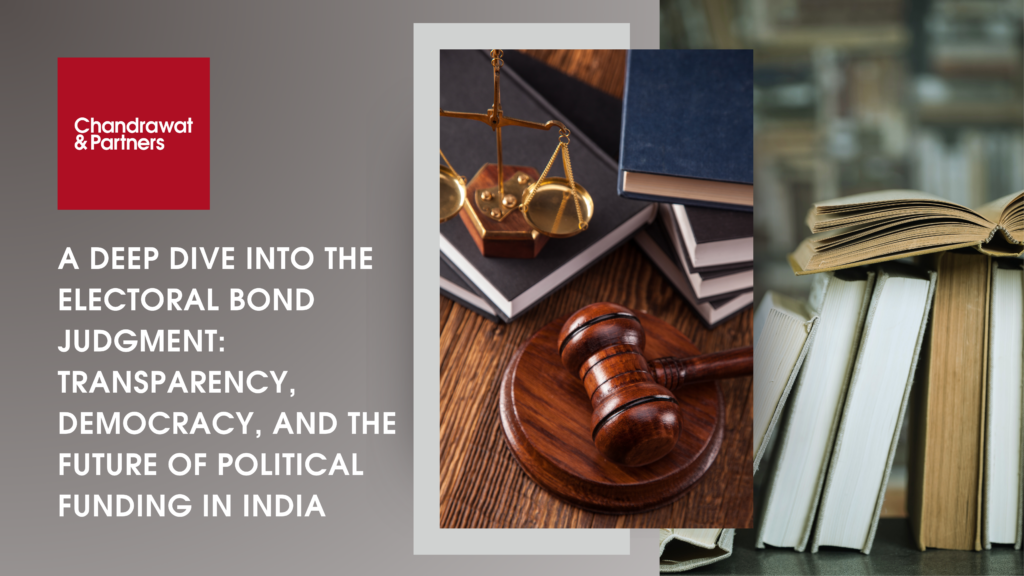Share :
Introduction
On February 15, 2024, the Supreme Court of India unanimously declared the Electoral Bond Scheme (“EBS”) unconstitutional, marking a monumental shift in India’s political landscape. This blog delves into the multifaceted dimensions of this landmark judgment, examining the arguments presented, the contentious issues, and its potential implications for the future of political funding in India.
A SCHEME UNVEILED WITH AMBITIONS
Introduced by the Finance Act, 2017, the EBS aimed to curb anonymous cash donations to political parties by replacing them with bearer bonds purchased from the State Bank of India (“SBI”). Proponents lauded the scheme as a step towards transparency, arguing that it would eliminate opacity and promote ethical funding practices.
AMENDMENTS AND EFFECT
The EBS intertwined with amendments to several key acts:
- Companies Act, 2013:
- Section 182(3): This section originally mandated companies to disclose details of political contributions exceeding Rs. 2,000 in their annual reports. The EBS-linked amendment exempted companies from disclosing the names of political parties they donated to, only requiring disclosure of the total amount contributed. This significantly reduced transparency and raised concerns about corporate influence in politics.
- Income Tax Act, 1961:
- Section 13A: This section was amended to:
- Allow deduction for donations made through electoral bonds, further incentivizing their use.
- Exempt political parties from maintaining records of donations received through electoral bonds, raising transparency concerns.
- Representation of the People Act, 1951:
- Section 29A: This section was amended to include electoral bonds as a mode of receiving donations by political parties.
- Section 29C: This section, requiring parties to report details of donations exceeding Rs. 20,000, was amended to exempt electoral bonds, further hindering transparency.
The effects of the amendments introduced by the Finance Act to the above legislations is that:
- A new scheme for financial contribution to political parties is introduced in the form of electoral bonds;
- The political parties need not disclose the contributions received through electoral bonds;
- Companies are not required to disclose the details of contributions made in any form; and
- Unlimited corporate funding is permissible
BUT CRACKS BEGAN TO SHOW
Critics voiced concerns about the scheme’s inherent flaws. The anonymity clause, they argued, masked the identity of donors, potentially allowing corporations and foreign entities to exert undue influence. Additionally, the limited disclosure requirements raised questions about accountability and the ability to trace the flow of funds.
THE BATTLE CRY REACHES THE APEX COURT
Several petitions challenged the EBS, culminating in a comprehensive judgment by a five-judge Constitution Bench.
Petitioners’ Contentions
- Violation of Article 19(1)(a):The anonymity provision undermined the right to information, essential for informed voting and a free and fair electoral process.
- Unequal Playing Field:Smaller parties would be disadvantaged due to limited access to corporate funding, creating an uneven playing field.
- Legitimization of Corruption:Anonymity could incentivize illegal donations and hinder investigations into electoral malpractices.
Government’s Contentions
- Curbing Cash Donations:The EBS aimed to eliminate opaque cash donations, promoting transparency and cleaner funding practices.
- Donor Privacy:Anonymity was necessary to protect contributors from potential harassment or reprisals.
- Level Playing Field:All parties had equal access to purchase bonds, ensuring a fair distribution of funds.
THE COURT’S BALANCING ACT AND VERDICT
The Court carefully weighed the competing interests of transparency and donor privacy. Ultimately, prioritizing the fundamental right to information enshrined in Article 19(1)(a), it declared several key amendments introduced by the Finance Act unconstitutional:
- Representation of the People Act, 1951:The proviso to Section 29C (1), exempting electoral bond donations from record-keeping requirements, was deemed violative of Article 19(1)(a). This shielded the identities of donors, hindering informed voter decisions.
- Companies Act, 2013:The amendment to Section 182(3), exempting companies from disclosing the names of political parties they donated to, also violated Article 19(1)(a). This reduced transparency concerning corporate influence in politics.
BEYOND THE HEADLINE: EXPLORING THE NUANCES
The judgment transcends a simple “transparency vs. privacy” debate. It highlights several critical issues:
- The Role of Money in Politics:The Court emphasized the need for reasonable regulation of political funding to curb undue influence and promote fair elections.
- Balancing Interests:Achieving a balance between transparency and legitimate donor concerns remains a challenge, requiring further deliberation and refined solutions.
- Enforcement Challenges:Even with stricter disclosure requirements, effective enforcement mechanisms are crucial to prevent circumvention and ensure genuine transparency.
THE ROAD AHEAD: NAVIGATING AN UNCERTAIN FUTURE
The future of political funding in India remains uncertain. The EBS has been struck down, and the pre-2018 legal framework, with its limitations, is reinstated. What lies ahead are critical questions:
- Will Parliament introduce a revised scheme addressing the Court’s concerns?
- What alternative mechanisms can ensure transparency and limit undue influence?
- How can enforcement mechanisms be strengthened to prevent loopholes and misuse?
CONCLUSION
The Supreme Court’s judgment signifies a vital step towards safeguarding transparency and upholding the integrity of electoral processes. However, the journey towards a robust and equitable political funding system is far from over. Navigating the complexities of balancing transparency, upholding democracy, and addressing legitimate concerns about donor privacy will require continuous dialogue, informed deliberation, and effective implementation of solutions. The Electoral Bond judgment serves as a crucial turning point, urging India to embark on this journey with renewed commitment and purpose.
For more information or queries, please email us at
enquiries@chandrawatpartners.com




